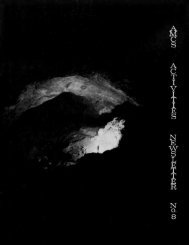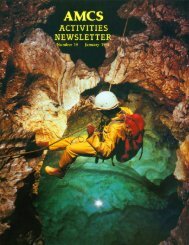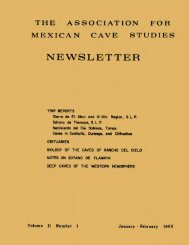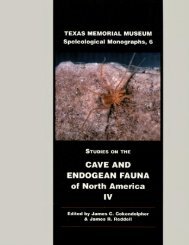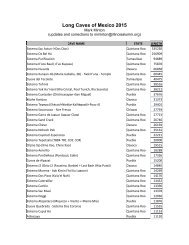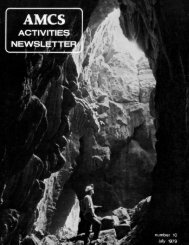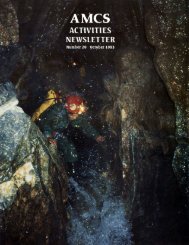asscciation for mexican cave studies box 7672 ut station austin ...
asscciation for mexican cave studies box 7672 ut station austin ...
asscciation for mexican cave studies box 7672 ut station austin ...
- No tags were found...
You also want an ePaper? Increase the reach of your titles
YUMPU automatically turns print PDFs into web optimized ePapers that Google loves.
27HUA~~ AREA SURVEY: Following the successful overland surveys of theOtate Mine, the San Juan plateau, and the Silvertip Cirque in '1ontana,many ~1CS <strong>cave</strong>rs have taken note of the usefulness of this type ofspeleological tool. Not only does a c~p<strong>ut</strong>er generated plot show whichpassages are likely to connect in an extensive system, b<strong>ut</strong> they alsogive us keener insight to the spepeogenesis of the <strong>cave</strong>s in a particularkarst area. The <strong>for</strong>mer was used to great advantage at Silvertip lastsummer •••knowing that that raunchy crawlway will connect gives muchgreater enthusiasm to the push crew.Besides the obvious advantages in the field, such a survey is apowerful graphic media <strong>for</strong> the final bulletin. TI.e reader immediatelyunderstands what is going on ~n the area -- which are the major systems,where they are located, and perhaps some insight into the full potentialof the system. .With the ultimate goal of a comprehensive bulietin on the Hua<strong>ut</strong>la,Oaxaca, karst region, we began the overland survey in January. Jim Smith,Jill Dorman, and I connected Rio Iglesia, Cueva San .\gustin, and Sotanode San Agustin with our ~atum point at Sr. Villega's house. Later, in.~~rch, Bill Steele and Jean Jancewicz surveyed to La Grieta (Sotano delCerro de Plaza). These segmer.ts were then connected with the main <strong>cave</strong>surveys. Downstream San Agustin 'vas surveyed by the cast of thousands(R. Schreiber, M. Smith, J. Smith, M. Stock, T. Davis, S. Kn<strong>ut</strong>son,D. Broussard, F. Binney, B. Stone, R. Jameson, G. Moni, W. Heller, w.Steele, J. Jancewicz, S. Zeman, D. Lowry, J. Lieberz) from December,1976, to April, 1977, during three separate expeditions. La Grieta wassurveyed Dec 1976-Jan 1977 by R. Jameson, P. Mothes, J. Smith, A. Cochrane,F. Binney, J. Horowitz, and B. Stone.. All other data <strong>for</strong> the plot (i.e., the long straight segments) wasreduced from published maps <strong>for</strong> which we are awaiting the original notes.Three notable observations can be made from the maps: La Grieta,thought to be a sure connection to San Agustin in January appears to bein a parallel drainage system, independent of the San Agustin system.Cueva San Agustin is ~ery close to Rio Iglesia in two places. The downstreamend of Rio Iglesia lines up almost exactly with the "upstream"dry trunk of lower San Agustin. A connection between Cueva San Agustin andRio Iglesia would make that system 662 meters deep and almost 4km long.A double connection to San Agustin would make "La Sistema de San Agustin"992 meters deep (5th in the world) and the longest <strong>cave</strong> in Mexico --over 10 km. On the other hand, tf La Grieta goes as deep as San Agustinand the higher sinkholes on the San Andres P~dge or on Cerro de Plazacan be connected, the "Sistema del Cerro de Plaza" would be approaching-1200 meters!gill Stone~-1e have just received a copy of the original survey notc:s <strong>for</strong> ~otanode San Agustin fron John Fish. A new more accurate nap of the IIua<strong>ut</strong>laArea should soon be available.



